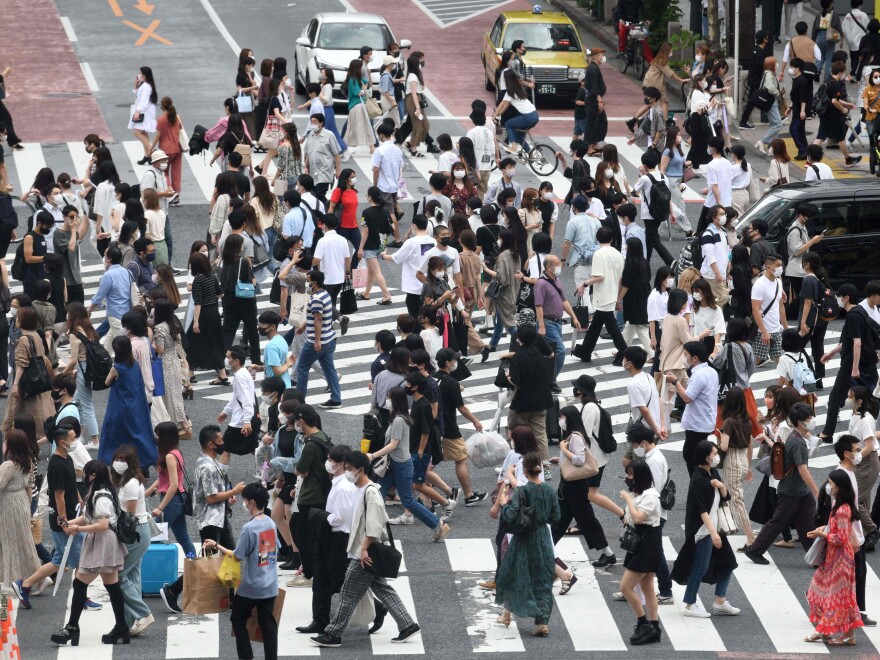TOKYO — In the year leading up to the delayed Summer Olympics, public opinion polls in Japan showed people overwhelmingly against holding the Games in the country. Some feared it would spread the coronavirus. Others complained about the high costs. There are still some small occasional protests. But now that Olympics are underway and Team Japan is doing well, people here seem excited.
You can find some people happy about the Olympics at the so-called "Shibuya scramble," billed as the busiest intersection in the world. Outside the Shibuya subway station, hundreds of people cross the street from different directions all at once. People watching here is a must–do for tourists and locals alike.
Hot temperatures and surging coronavirus numbers
It's been hot in Tokyo, and some people carry umbrellas to shield themselves from the blazing sun. Everyone wears a face mask.
"It's so dangerous because of corona," says Reggie Ohashi, a student who's here with friends, hanging out at Shibuya Crossing. There's been a surge of coronavirus cases since the Games began. Ohashi says from the safety of his apartment, he's been catching local broadcasts of the baseball games at the Tokyo Olympics.
University student Wakanda Ito says she's been tuning in to watch Olympic volleyball, soccer and a new sport at these Games, skateboarding.
"I heard he's really famous," Ito says, referring to 22-year-old Yuto Horigome, who won the first Olympic gold medal for street skateboarding. "He is very talented and he's really handsome."
Ito says she was also impressed by Horigome's compatriot, a cute 13-year-old girl named Momiji Nishiya. She also earned a gold medal in street skateboarding.
Japan's record gold medal haul buoys spirits
Many of the young Japanese people I meet at the Shibuya crossing say they're excited about all the Japanese athletes who are winning, even though the COVID-19 restrictions mean they're not allowed to watch the Games in-person.
University student Shuhe Horiyama says he enjoys watching the Games on TV with his family. But he does wish he could be in the stands to watch them in person. "Actually, I had Olympic Games tickets," he says. "I was very much looking forward to seeing in the stadium. You know, it's not just a normal ticket, it's the final of the football, the sport that I like the most. That's why I'm really sad and frustrated."
Horiyama blames the Japanese government for its delay in getting people vaccinated. Currently just 29% are fully vaccinated. He says many people changed their opinions of the Games because so many Japanese athletes are winning medals. "Yeah, actually, I think it was very big news for us Japanese people," he says.
So far, Japan has won more Olympic gold medals than ever before: 17 and counting. That includes gold medals in judo, for siblings Uta and Hifumi Abe and two-time champion Shohei Ono. Swimmer Yui Ohashi became the first Japanese woman to win two gold medals. Other gold medalists include the Japanese table tennis team and the men's fencing team.

On the streets of Tokyo streets, though, there are almost no signs or banners celebrating the Olympics. Highlight clips of the Games flash on one of the many big screens on the buildings at the Shibuya intersection. But nobody seems to bother looking up to watch. It seems they have other things to do.... such as singing and dancing.
Celebrating the Games wherever you are
On one corner of the Shibuya Crossing, I stumble upon the members of a JPOP idol group. They're giggling, taking selfies and getting filmed by a foreign TV news crew. One of them has pink eyeliner and bleach blonde hair, styled like an anime character.
Are they famous?
"So-so," laughs Runa Kanzaki, the most talkative of the group.
I ask what they think of the Olympics being held in Tokyo. At first they say something about COVID-19. Then they begin listing all the Olympic sports they've been following on TV: volleyball, basketball, swimming ... and basically all of the events.
So are the Olympics good for Japan?
"Good, good," nods Kanzaki. Her friend Nana Sagasake cheers "Yay."
Then they launch into a pop song that's very kawaii.
Regardless of Tokyo's state of emergency, life goes on in the Japanese capital. And so do the Olympics.
Copyright 2023 NPR. To see more, visit https://www.npr.org.



